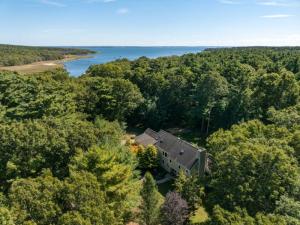PCBs, lead discovered in Dartmouth neighborhood
An investigation is underway to determine the extent of possible soil contamination in the Bliss Corner neighborhood after toxic chemicals were found at a construction site.
According to the Massachusetts Department of Environmental Protection, the agency discovered elevated levels of heavy metals, lead, polycyclic aromatic hydrocarbons (PAHs) and polychlorinated biphenyls (PCBs) at a housing lot at 20 Kraseman St. in January.
The discovery was made after MassDEP became involved in a separate investigation, concerned the land had been used as a landfill for toxic chemicals and trash in the past, unknown to environmental officials until recently.
The concern was triggered after a construction company unearthed waste material at 85 McCabe St. during the demolition and replacement of a single-family home in late 2018. The waste material indicated the land might have been used as a landfill in the past, prior to the neighborhood’s residential development. Similar waste material was discovered at neighboring 20 and 21 Kraseman St., and 31 McCabe St.
MassDEP personnel discovered a consistent pattern of waste material, which in a press release officials describe as “discolored soil (blackish) containing broken glass, scrap metal, bricks, shingles, and tar-like material.”
Newspaper clippings dating back to the 1930s indicated the land was indeed used as a dump before being turned into a residential neighborhood. The PCBs and other chemicals were positively identified during laboratory testing of the waste material removed from 20 Kraseman St.
According to the National Oceanic and Atmospheric Administration, PCBs are industrial chemicals that were banned in 1979 due to impacts on human and environmental health. The chemicals were commonly used in electronics, transformers, and as lubricants and hydraulic fluids.
The South Coast is no stranger to PCB contamination, owing to the region’s industrial history. New Bedford Harbor is one of the Environmental Protection Agency’s largest Superfund cleanup sites due to significant PCB contamination. Cleanup efforts in the harbor began in the 1980s and is ongoing.
Contamination resulted in restrictions being placed on fishing, shellfishing, and lobstering in and around the harbor due to the risks of human exposure to PCBs through consuming exposed marine life.
The extent of the contamination found in Dartmouth’s Bliss Corner neighborhood has not yet been determined. However, officials are advising residents to take precautions as the investigation is in its early stages.
Residents in Bliss Corner who know of waste material on their property are asked to contact MassDEP at 1-888-304-1133.
This material is likely found within the first three feet of soil, and may include very dark brown to black soil containing broken glass, scrap metal, construction debris, and bricks, but might also contain an array of industrial and construction trash.
Residents who suspect their properties could be affected should refrain from digging on the property until MassDEP can investigate. Gardening in the area should also be done under state “Best Management Practices,” which includes building raised beds or container gardens and washing hands and vegetables thoroughly.
For more information, MassDEP has created an FAQ on its site. The latest developments can be tracked through MassDEP’s online document tracking system.



































